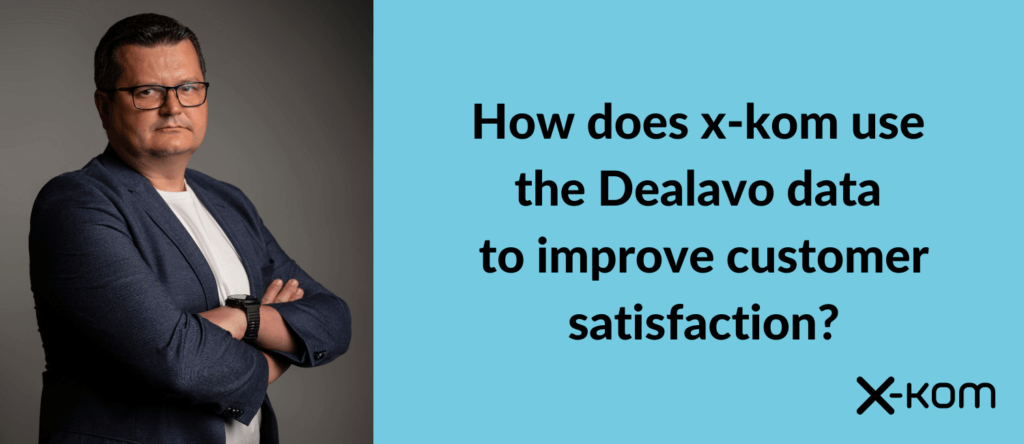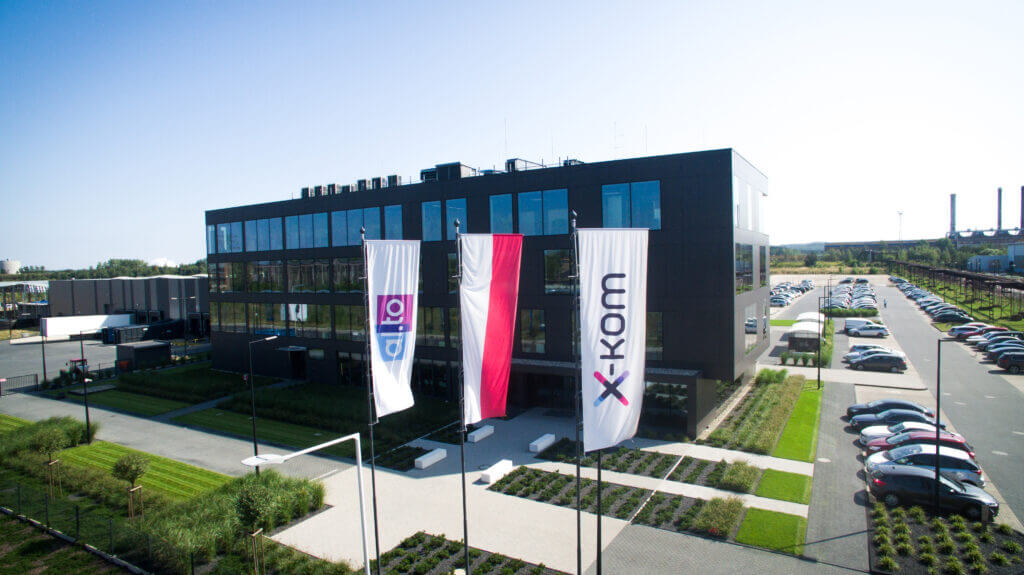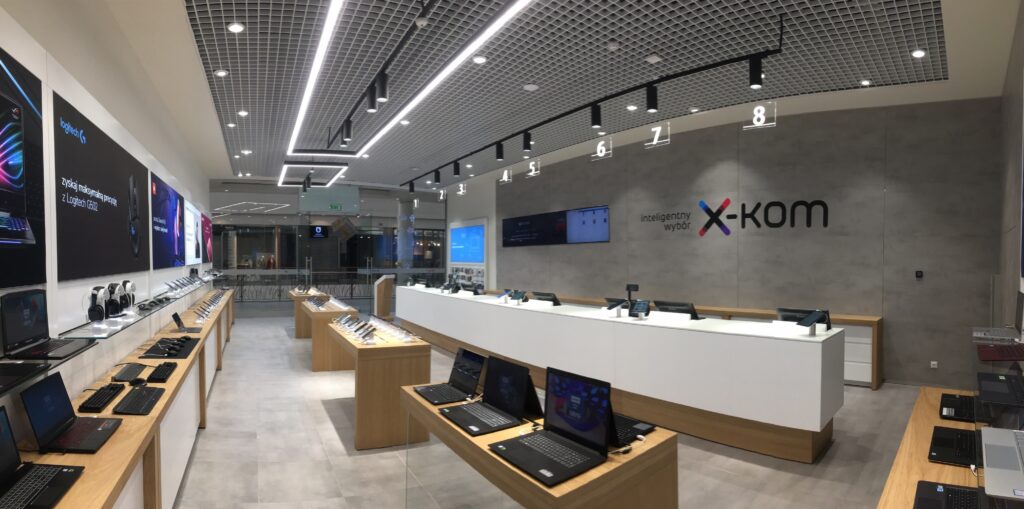
What do customers pay attention to when shopping online?
Why do people who buy electronic goods prefer to pick up their products at the shop rather than have them ordered home?
How to use the Dealavo data to better meet the needs of the customers?
This is explained by Marcin Witkowski – Director of the Analytics and Business Support Department at x-kom.
Aleksandra Hołownia, Dealavo: x-kom is one of the biggest online shops in Poland. Can you tell us something more about your company?
Marcin Witkowski, x-kom: As part of our e-commerce activity, we own several domains. x‑kom.pl is the biggest one, and we use it to sell consumer electronics. al.to is another of our companies. Its offering is similar to x-kom, but it also sells toys and household appliances (both large and small). Finally, there is combat.pl, which offers military goods. We are also active on the German market as x-kom.de.
We focus on online sales, but we also have 27 physical stores in large Polish cities. Their location is not random – we analysed where the biggest number of parcels were sent, and we decided to open our stores there. We believed that these were the locations where the customers would be most likely to collect their purchase at the store.
In our field of business, we focus on the customer first. Everything we do, we do for our customers. Why? Because it is the customer who decides if they want to buy the product from us or from our competitors. If the customer has already decided on a specific product, it is our role to encourage them to purchase it from us and not someone else.

A.H.: In your opinion, what is the best way of achieving this goal?
M.W.: To answer this question, we have to once again look at the situation from the perspective of the customer: what are they looking for? According to recent studies, the two most important factors for the customer are: price and short delivery time.
Market research shows that both the market and the customers are changing. The online market is very dynamic, especially in Poland, and the outbreak of the pandemic only accelerated its growth. I have been working in the consumer electronics sector since 2004 and I have never before seen such increases as those recorded during the last year and a half.
Earlier, when online shops in Poland were just starting, the customer paid the biggest attention to the price – 80% of people made purchases online because of the huge differences between online and offline prices. Now, the price differences are not so big. The market is also changing – currently, new stores in our sector do not appear so often, and a few big players, owning both physical and online stores, have a combined market share of 85%.
As I have already said, we try to look at things from the customer’s perspective. One of the most important factors is the price, so we make sure the price is not higher than what the market offer. And that is why we use the Dealavo data – to monitor the market and make decisions based on high-quality data.
Delivery time is another factor crucial for the customer. When a customer places the order, they feel like they already own the product, and they want to get it as soon as possible. At x‑kom, we have significantly shortened the time of delivery over the last two years. The customers have definitely noticed – they no longer have to wait 2 or 3 days for the delivery; in most cases, they receive the goods they ordered on the next day.
Other crucial aspects are the reputation of the store and the equipment we offer. The customers are already used to shopping online, and they expect to make a purchase without any issues. Even if some problems do appear, the customers will still appreciate shops that can solve them quickly and respond to their needs. The form of communication with the customer is also changing – we contact the customers through different channels, such as e-mail, chat, instant messengers or social media. We have to remember that satisfied customers rarely write positive comments on social media, saying that “The shop is great because I made a purchase there and everything went fine”.
A.H.: If something goes wrong, however, for instance, if there is a problem with the packaging…
M.W.: When something is wrong, we immediately receive plenty of hate on the Internet. That is why, in such situations, we ask the customers to contact us directly so we can solve the problem individually. Naturally, we have our standard procedures, but we still do our best to help our customers. We want them to be happy and satisfied with the purchase.
Customers also pay more attention to reviews – they read what other people wrote about the shop and check how many customers have bought a particular product. This has a psychological effect – we tend to think that if a thousand people have already bought a product, we can safely buy it as well. It also helps us justify our purchase.
A.H.: And builds trust at the same time.
M.W.: Yes. We have been working for 20 years now to win the customer’s trust. We adapt to whatever is happening on the market, and the customers see it and appreciate it.
x-kom is a specific company – our customers are really young people. And today’s teenagers can very quickly become unhappy with the shop – if there is something they do not like, they will immediately go over to the competition. And we cannot forget that we are not the only ones on the market.
A.H.: You said that you also owned physical stores. How to combine online sales with selling products in physical stores? What is the role of marketplaces, which are becoming increasingly popular?
M.W.: As x-kom, we have 27 physical stores that also serve as pick-up points. In the electronics sector, the customers very often decide to pick up the products they ordered at our store, even if delivery to their house is free. At first, I was surprised by this, and I started to ask the customers about it when they came to the pick-up point. It turns out that some of them are afraid to pay online and others want to see the product themselves before paying for it. They want to check if the product specifications were accurate and make sure that they actually want to buy the product. If they decide they are not interested, they can just leave it at the counter. This option is so important for some of the customers that they are ready to cross the whole city to get to the pick-up point. For us, it is also one of the forms of contact with the customer.
We can say that we offer multi-channel selling, but you should know that our stores are not big, they are often about a hundred square meters or so. Of course, the customer can come to the shop and choose a product from the shelf, but the choice is limited to around 3–4 thousand items, whereas, on our website, they can choose from 30 thousand products. Thus, there is a huge difference between the offering available in these two channels.

As for marketplaces, we do not consider them as our main channel, we try to focus on being a specialised shop. The electronics market in Poland is specific, and Amazon had to spend five years in preparation before coming here. In Poland, the owners of all big shops with electronic products, apart from Media Markt, are Polish, with no foreign capital, and they have been on the market for 20 years. This is unusual in comparison with the rest of the world.
It is a common trend that people prefer to buy electronic goods from specialty dealers. Today, everyone really appreciates professional advice. Even if they look for information about the product on the Internet before making a purchase or ask their friends for advice, they still want to be 100% sure at the last moment, just before making the final decision, the final click. At a physical store, they can simply ask the seller: “Is it good?”. That is why we try to be really close to the customer also online and provide them with the easiest possible access to information and professional advice.
A.H.: What are the other ways in which you ensure customer satisfaction?
M.W.: We use an extensive amount of external data. After all, what gives power in contemporary times? Information and data. Everybody claims to know this, but only a few really know how to use them. Many people do not respond quickly enough. We process a lot of data and feed it into our system. This way, our product manager will have all the information in one place.
We use the Dealavo data in two ways – we analyse price data and observe how the market changes. We look at what the competition offers and we compare this with our own offering. This way, we understand what our competitive advantages are and we see the areas that need further improvement – there is always something that can be improved. We have a business plan that we consistently implement (and consistency is very important in business), but we do not assume that we know everything. That is why, from time to time, we have to make sure that we are going in the right direction – in my opinion, the direction may be right, but it may turn out that we are straying off course by 2–3 degrees. In the first year, nobody would even notice, because the difference would be so small, but after 5 years, we could be distancing ourselves from our customers. That is why we do our best to remain close to our customers, always staying one step ahead of them. We also use the Dealavo reports to check what products appear on the market and respond if the needs of the customers change.
Having an extensive offering is also very important for us – we want to have products from a specific category in various price ranges. Not everybody wants to buy a laptop for PLN 5000; for some people, it is enough to have a product for PLN 2000. And we have to adapt accordingly. We want everybody to be able to find the product they need in a specific price range on our website – we have equipment for geeks and gamers, but also products for anyone who needs a laptop only for work, remote learning or to use Teams. We want our website to be addressed to everybody.
A.H.: What customer trends are you expecting in the near future?
M.W.: What I am sure of is that the online market will still be growing. Some customers are going back to shopping at shopping centres, but now, after the pandemic, the majority of us already have experience with buying products online and our perspective has changed. A new generation is entering the market, people who enjoy shopping online – these are the ones who are never without their smartphones and like to buy things on their phone. However, they must trust the shop and be sure that they can always exchange a product they do not like – that is why we offer them free returns to parcel lockers.
In Poland, there is still much to do in the realm of online sales. In the UK, more than 50% of total sales are done online, in Germany – 38%, in the Czech Republic and Slovakia – 34%. And in Poland? Depending on the month, it is around 20% to 25%. My bet is that, during the next few years, this level will be increasing until it eventually stabilises – the question is, at what point? Will we reach the magical 50/50? In my opinion, not in this decade. However, online sales will definitely be growing – Michał Świerczewski knew it already 20 years ago when he was starting x-kom.
What is another advantage of online sales? Today, time is a luxury – we never seem to have enough time. And an online shop is open 24/7. You do not have to leave your house. You just place the order. You do not have to pick up the parcel, but just wait for the courier to bring it, and that’s it. People appreciate this because they value their time. Nowadays, our website never really “sleeps”. Before, there were times when, between 2 and 4 in the morning, there would be no traffic at all. However, this all changed three years ago.
It will be a challenge to gain new customers and retain those who have already made a purchase on our website. As x-kom, we try to keep them close to us for as long as possible. We keep in touch with our customers and encourage them to make another purchase – we make sure they do not forget us.
I believe that what I am saying may be obvious to some. However, the truth is that only a few companies know how to do these things right. And it is crucial to take all these aspects into account and see them as parts of a greater whole, the big picture.